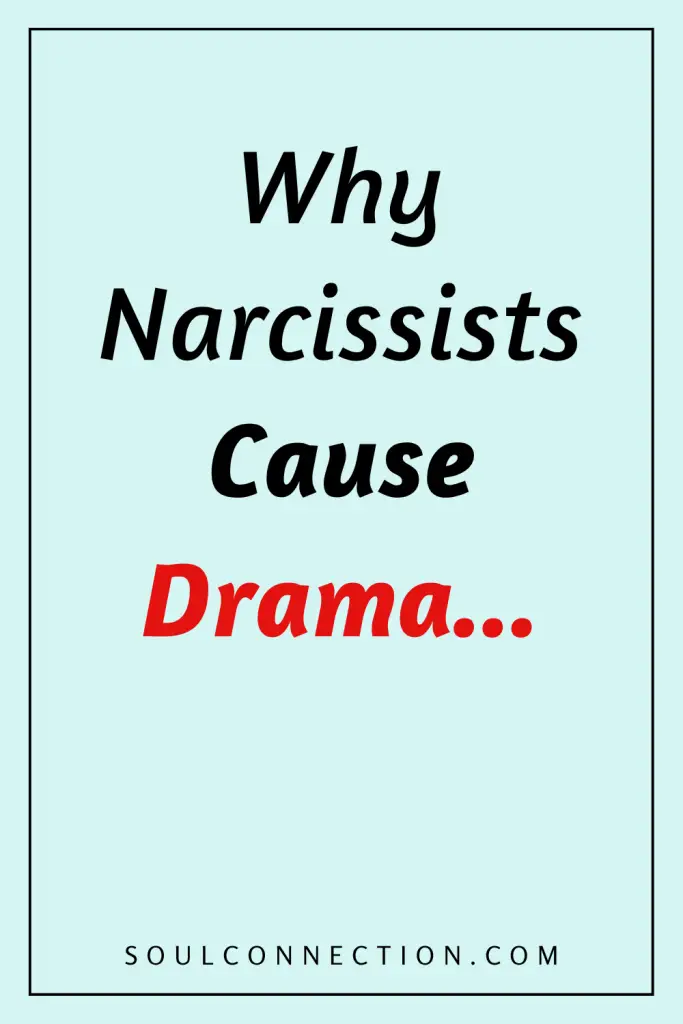People joke about “drama queens,” but living with a true narcissist is less reality TV and more emotional rollercoaster—minus the safety harness.
If you’ve ever wondered why chaos seems to swirl around certain people like a personal weather system, you’re not imagining things. Narcissists don’t just attract drama; they manufacture it, often with the flair of a soap opera villain who’s running out of plot twists.
Turns out, there’s a method to their madness. Understanding that method can help you keep your own peace (and maybe keep your wine budget in check).
The Need for Attention Is Bottomless
Narcissists crave attention the way most of us crave carbs after a breakup. Ordinary affection just doesn’t cut it; they need the spotlight turned up to full beam, all the time.
When things get calm or, heaven forbid, someone else has a moment to shine, a narcissist can’t help but stir the pot.
They know that drama is the quickest way to reclaim center stage. Outbursts, tears, mysterious ailments, or even orchestrated misunderstandings—all serve to pull focus back where they feel it belongs.
If you’re feeling whiplash from their antics, you’re definitely not alone.
Control Is Their Love Language
It’s hard to relax when you sense someone is always three moves ahead—especially if those moves involve your emotions. Narcissists thrive on control.
Drama gives them a handy excuse to micromanage others, set new rules, or shift blame.
When you’re constantly off balance or dealing with a “crisis,” you’re less likely to challenge their authority. It’s manipulation with a hint of chaos: just enough to keep you guessing, too much for comfort.
Empathy: Never Written Into the Script
The empathy gene may have skipped a generation (or three) with most narcissists. This means they struggle to read the room or acknowledge when they’ve crossed a line.
If someone gets hurt, it barely registers—unless, of course, it’s useful for the next dramatic scene.
Without empathy, the impact of their words or actions isn’t part of the equation. As a result, their drama can be astoundingly tone-deaf, leaving you wondering if you’re in a comedy or a tragedy.
The Thrill of the Game
Narcissists aren’t just in it for the attention; they also love the thrill. The drama itself is entertaining, a power play that spices up their day.
Arguments become sport, emotional wounds become ammunition, and peace feels suspiciously like boredom.
If things are going smoothly, a narcissist might manufacture a problem just to shake things up. For them, harmony is dull, but chaos is invigorating—at least for as long as they’re winning.
Shifting the Blame Keeps Them Safe
Ever noticed how narcissists rarely admit fault? No matter what happens, they always seem to land on their feet, often by tossing someone else under the bus.
Drama provides endless opportunities for blame-shifting.
If you catch them in a lie or call out bad behavior, suddenly you’re the villain. They rewrite the story so quickly, you’ll wonder if you hallucinated the whole saga.
Gaslighting and drama go together like gin and tonic: a classic, if slightly toxic, combo.
Every Relationship Is a Stage
Relationships are supposed to be partnerships, but for narcissists, they’re more like theatrical productions with themselves in the starring role. Friends, family, and partners become supporting characters—props in their ongoing drama.
If you attempt to live your own life or step out of line, expect a dramatic plot twist. Tantrums, silent treatments, or public outbursts aren’t accidents; they’re calculated moves to remind everyone who’s directing the show.
Boundaries Are the Enemy
Most narcissists view boundaries the way cats view closed doors: deeply offensive. Setting a limit—whether it’s time, energy, or emotional investment—can trigger all sorts of melodrama.
Tears, anger, or guilt-tripping may follow, often on repeat.
Their goal? Wear you down, so you’ll drop your boundaries and let them back in. The drama isn’t random, it’s a full-court press to keep their access to your resources wide open.
The Fear of Being Exposed
No matter how confident a narcissist appears, insecurity is bubbling just below the surface. They live in constant fear of being unmasked or criticized.
Drama can provide a convenient distraction, pulling everyone’s attention away from their weaknesses.
If you get too close to the truth, expect a sudden storm—accusations, distractions, or even a calculated “crisis.” Anything to keep the focus off their own flaws.
The Cycle of Idealization and Devaluation
Ever felt like you went from hero to zero overnight? Narcissists often swing between adoration and contempt with dizzying speed.
This cycle itself creates drama: one minute you’re the best thing since sliced bread, the next you’re public enemy number one.
These emotional highs and lows leave you exhausted—and far more focused on keeping the peace than questioning the script.
Drama as a Habit
After years of living in emotional mayhem, drama becomes second nature. For some narcissists, it’s the only way they know how to relate.
Calmness feels foreign, even threatening. When there isn’t a crisis, they’ll create one—because chaos is their comfort zone.
If you keep getting sucked in, it’s not a personal failing. You’re simply caught in someone else’s well-rehearsed routine.
How to Sidestep the Cyclone
It’s tempting to get drawn into the tornado of a narcissist’s drama. Sometimes it feels impossible to avoid. But you do have options, and they don’t involve becoming a master chess player or investing in earplugs.
- Stay grounded in your reality. When the script gets wild, check in with yourself. Facts are your best defense against gaslighting.
- Hold your boundaries. Don’t be surprised if you get pushback; stick to them anyway. Consistency is key.
- Refuse the starring role. Not every scene needs your performance. Sometimes, walking away is the bravest choice.
- Find support. Friends, therapists, and support groups can help you reclaim your sanity. (And they never charge for listening.)
- Avoid JADE-ing. That’s Justify, Argue, Defend, or Explain. You don’t owe a narcissist an explanation for protecting your peace.
Worth the Drama?
The real question isn’t why narcissists cause drama—it’s how much you’re willing to tolerate. You can’t change a narcissist, but you can change your role in their show.
Drama doesn’t have to be the price of admission for love or friendship. Setting boundaries, refusing to play along, and protecting your own emotional health isn’t selfish; it’s survival.
And if you ever feel guilty for prioritizing yourself, just remember: Real relationships might have their ups and downs, but nobody should feel like they’re living in an endless soap opera—even if you’ve always fancied a bit of drama.


